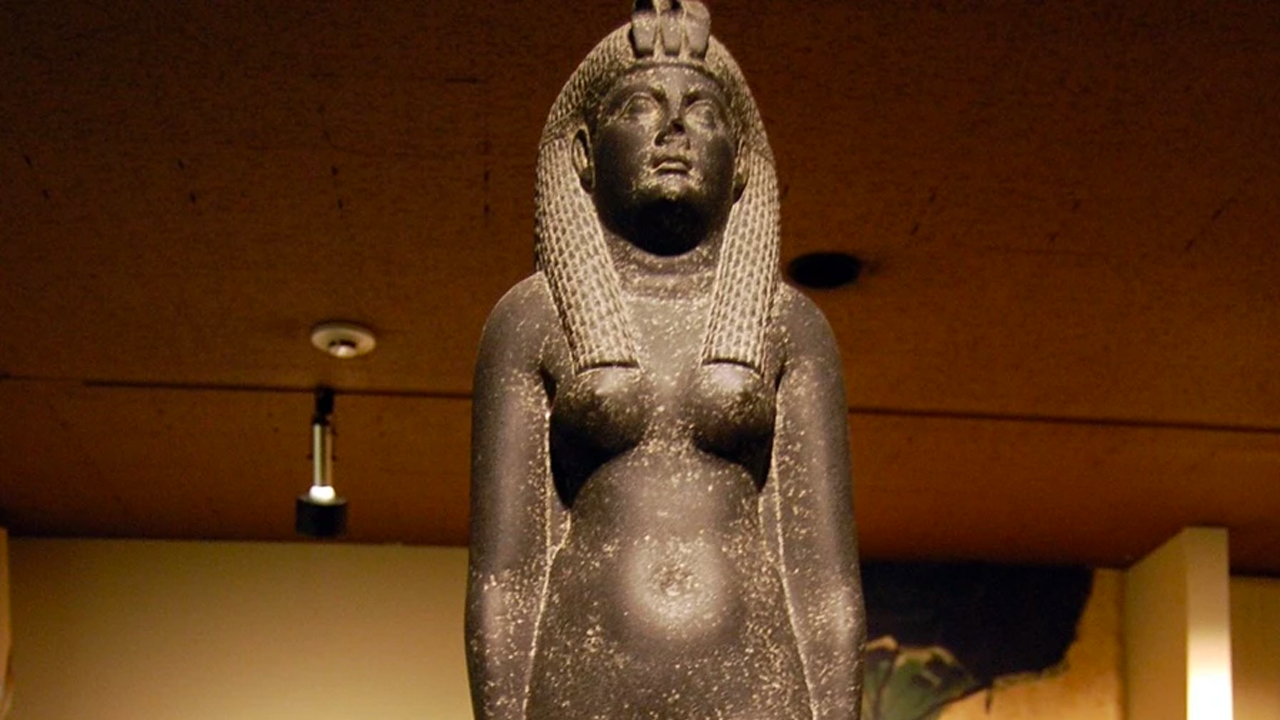When we think of ancient Egypt, most of us recall first its most famous and distinctive features: pyramids, pharaohs, and the Nile. As an economic historian, I hoped at the start of recent research that a sound currency might be another distinction of the Egyptians I would discover.
Alas, their story is pretty much the same one we find throughout history and all over the world: Money is monopolized by government officials, who then cheat the people by debasing it—which means diluting the precious metal content in it’s coinage, printing too much of it if it’s paper, or both. Egypt is no exception, though its experience is rich in colorful perpetrators, from fifteen pharaohs named Ptolemy to the Cleopatra of both Shakespeare and Hollywood fame.
For several thousand years, Egyptians bartered and made payments in kind (taxes, for example, were often paid in grain). A mixture of gold and silver called “electrum” figured in large transactions among a few elites but was not widely circulated.
Though coinage debuted in the eastern Mediterranean around 650 B.C., it took three more centuries for it to appear in Egypt. When Alexander the Great from the northern Greek region of Macedonia expelled the Persians from Egypt in 332 B.C., he founded the city of Alexandria and set the stage for 300 years of Greek rule over the denizens of the Nile.
Alexander himself remained in Egypt for less than a year before departing for further conquests in the East. When he died in Babylon in 323 B.C. at the age of 32, his general and confidant Ptolemy became the first dynastic leader of a “Hellenized” (Greek-influenced) Egypt. Every male in his line assumed the same name until the last one, Ptolemy XV.
When a female in the line of succession ascended the throne, she took one of three names: Arsinoe, Berenice, or Cleopatra. The one we all know from our ancient history classes, played by Elizabeth Taylor in the 1963 Oscar-winning Hollywood blockbuster, was Cleopatra VII, Egypt’s final ruler before Roman occupation began in 30 B.C.
The Greeks introduced coinage to Egypt in the reign of Ptolemy I. By the end of the reign of Ptolemy II in 246 B.C., the simplicity and efficiency of the money economy made possible a flourishing of commerce previously inconceivable through barter alone.
During this early period of Hellenization, the fabulous Library of Alexandria (with its 700,000 papyri scrolls) and the immense Pharos Lighthouse (the tallest building on the planet and one of the Seven Wonders of the World) were constructed. Alexandria was on its way to ranking as the Mediterranean’s most beautiful metropolis.
Author and historian Dr. Bob Brier, an Egyptologist at Long Island University, maintains that the first three Ptolemies were the good ones. Their successors were tyrants and murderers, torturing and killing even their own family members on a rather routine basis. Lord Acton knew what he was talking about when he wrote, “All power tends to corrupt; absolute power corrupts absolutely.” Corrupting the currency was but one of many Ptolemaic sins.
Two decades after Alexander’s death, the precious metal in both the silver and gold Egyptian drachmae coins fell to 80 percent of their initial weights.
“The calibre of Ptolemaic currency as a whole varied wildly,” explains Arienne King, “as later monarchs debased the currency by reducing the percentage of precious metals in order to finance wars or cope with economic hardship.”
Currency competition was outlawed under the Ptolemies. Everyone, even foreign merchants seeking to do business in Egypt, were mandated to exchange other coins into Egyptian money immediately. They were required to do so at government offices, which meant that the government raked off all the profits from the transactions.
Annual price inflation in Egypt today is approaching 40 percent, for the same reason it exceeded even that robust rate more than 2,000 years ago—namely, the government in Cairo printed too many paper pounds just as the Ptolemies in Alexandria minted too many drachmae of depreciating precious metal content.
In the face of soaring prices, do you suppose the inflating Ptolemies repented by cutting their spending, balancing their budgets, and restoring sound money? That would be very much out-of-sync with their increasing depravity, so the answer is a resounding NO! Instead, they imposed comprehensive wage and price controls.
In The Economic Life of the Ancient World, French historian Jean-Philippe Lévy reveals,
Control took on frightening proportions. There was a whole army of inspectors…In villages, when farmers who were disgusted with all these vexations ran away, those who remained were responsible for the absentees’ production. The pressure applied [by the inspectors] extended to cruelty and torture…After a period of brilliance, the Egyptian economy collapsed…as did her political stability.
Ptolemy XII ruled from 80 to 58 B.C. and then again from 55 B.C. until his death in 51. Up to his eyeballs in debt to Roman creditors, he engineered a massive devaluation of the silver currency. When he was done, the coin’s silver stood at a mere 33 percent.
According to another French historian, Michel Chauveau, who authored a fascinating book a quarter-century ago titled Egypt in the Age of Cleopatra, Ptolemy XII’s money mischief marked “the financial collapse” of the dynasty as well as “the prelude to its political death throes.”
Cleopatra VII inherited the financial nightmare her predecessors created, but she only worsened it by cutting the silver in Egypt’s currency another 50 percent. Her dalliances with Julius Caesar and Mark Antony did not end well. The last Egyptian pharaoh, she died by her own hand in 30 B.C., paving the way for Octavian (the later Emperor Augustus) to incorporate Egypt as a province of the Roman Empire.
So, it turns out that Egypt was no exception to the rule that governments can’t be trusted with money. It’s a lesson of monetary history so monotonous and repetitive that I may now devote my time to finding that rare instance in which a government monopolized money and then improved it in some lasting way.
Wish me luck.
This article originally appeared at the Foundation for Economic Education.
Img credit: Flickr - Tiffany Silva

About the Author:
Lawrence W. Reed is FEE's President Emeritus, Humphreys Family Senior Fellow, and Ron Manners Global Ambassador for Liberty, having served for nearly 11 years as FEE’s president (2008-2019). He is the author of the 2020 book, Was Jesus a Socialist? as well as Real Heroes: Incredible True Stories of Courage, Character, and Conviction and Excuse Me, Professor: Challenging the Myths of Progressivism. Follow him on LinkedIn and Parler and Like his public figure page on Facebook. His website is www.lawrencewreed.com.





